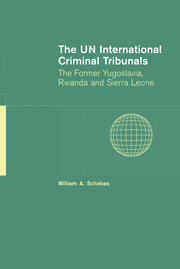Book contents
- Frontmatter
- Contents
- Preface
- Table of cases
- Table of legislative provisions
- List of abbreviations
- PART I Establishment of the tribunals
- PART II Jurisdiction
- PART III Substantive and procedural aspects of prosecution
- 9 General principles of law
- 10 Investigation and pre-trial procedure
- 11 Trial and post-trial procedure
- 12 Evidence
- 13 Rights of the accused
- 14 Punishment
- PART IV Organisation of the tribunals
- Bibliography
- Index
10 - Investigation and pre-trial procedure
Published online by Cambridge University Press: 05 June 2012
- Frontmatter
- Contents
- Preface
- Table of cases
- Table of legislative provisions
- List of abbreviations
- PART I Establishment of the tribunals
- PART II Jurisdiction
- PART III Substantive and procedural aspects of prosecution
- 9 General principles of law
- 10 Investigation and pre-trial procedure
- 11 Trial and post-trial procedure
- 12 Evidence
- 13 Rights of the accused
- 14 Punishment
- PART IV Organisation of the tribunals
- Bibliography
- Index
Summary
The statutes have almost nothing to say about the procedure of the tribunals. The matter is left to the judges, who are invited to develop Rules of Procedure and Evidence for the conduct of the pre-trial phase of the proceedings, trials and appeals, the admission of evidence, the protection of victims and witnesses and other appropriate matters. Articles 18, 19 and 20 of the ICTY Statute, and corresponding provisions in the Statute of the ICTR, provide slightly more detail about the procedural approach. The SCSL Statute does not contain even these modest procedural provisions. Instead, the SCSL Statute imposes the Rules of Procedure and Evidence of the ICTR, subject to subsequent amendment, with the consequence that a largely similar procedure approach is imposed.
There are stories of a legendary meeting of ICTY judges, early in 1994 just following their election, at which various views of an appropriate procedural and evidentiary model were debated. Each of the judges came from a national system and had little and often no experience with any international models or other national models. It was a confrontation driven more by ignorance of other systems than by any principled devotion to a particular approach. Professor James Crawford has spoken of ‘the tendency of each duly socialized lawyer to prefer his own criminal justice system's values and institutions’. The lawyers working at the Tribunal also left their mark. As Louise Arbour has described it:
You know, when you work within an institution, you give it a culture. The International Criminal Tribunal for the former Yugoslavia was originally staffed by twenty-five US attorneys who donated their time for a couple of years. […]
- Type
- Chapter
- Information
- The UN International Criminal TribunalsThe Former Yugoslavia, Rwanda and Sierra Leone, pp. 348 - 409Publisher: Cambridge University PressPrint publication year: 2006



